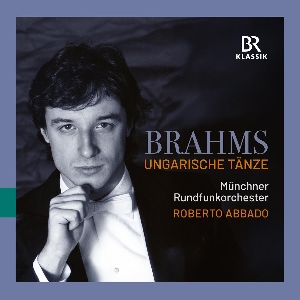
Johannes Brahms (1833-1897)
21 Hungarian Dances Wo 01 (arrangements for orchestra)
Munich Radio Orchestra/Roberto Abbado
rec. 1996-97, Herkulessaal der Residenz, Munich
BR Klassik 900360 [51]
BR Klassik have been mining their back catalogue for both live and studio recordings and these are from towards the end of Roberto Abbado’s tenure as Chief Conductor of the Müncher Rundfunkorchester. The notes here by Guido Johannes Joerg make a good job of explaining the 19C “bourgeois enthusiasm for so-called ‘gypsy romanticism’”, discussing the confusion and disputes regarding the origins of the music and clarifying who made the various orchestral arrangements of the twenty-one dances here. They are all based on short folk melodies and exhibit the repeated, characteristic pattern of alternating between fast and slow tempi and major and minor keys; originally for piano with four hands, then for solo piano, then variously arranged for orchestra as per here, they were immediately successful and remain among Brahms’ most popular works to this day.
I have long been satisfied with a 1988 recording by the Budapest Symphony Orchestra conducted by István Bogár on the Naxos label, though this slightly later recording is rather more sophisticated in terms of sound and execution; Bogár is very marginally swifter and more driven throughout, whereas Abbado makes a little more of the extremes of tempo. Both conductors are alive to the potential for a certain gawky charm in numbers such as No. 3, which is a close kin to certain of Dvořák’s Slavonic Dances but I think the echt Hungarians’ resinous woodwind in that and No. 4 are more attractive than their urbane German counterparts – but perhaps Abbado finds more slancio in that number and the richer sound pays dividends there, too, in bringing out the surging passion of the main theme. I am not going to fall into the trap of trotting out the cliché that “only Hungarians can play their national music” as I believe it no more than I maintain that “only English orchestras can play Elgar”; besides, for all that he obviously loved Hungarian music, Brahms was resolutely German – but he embraced the idiom whole-heartedly, just as the Italian Abbado and his Munich orchestra do here.
In brief, I am not going to say that this is the only disc to have if you want to enjoy this wonderfully uplifting music – but I will unequivocally assert that it is another fine option.
Ralph Moore
Orchestral arrangements by Brahms (1, 3 & 10), Antonín Dvořák (17-21), Hans Gál (8 & 9), Andreas Hallén (2), Paul Juon (4), Albert Parlow (5, 6, 11-16) & Martin Schmeling (7)
Note – the download version of this recording has been split into two products 1-10 & 11-21.
Buying this recording via a link below generates revenue for MWI, which helps the site remain free




















